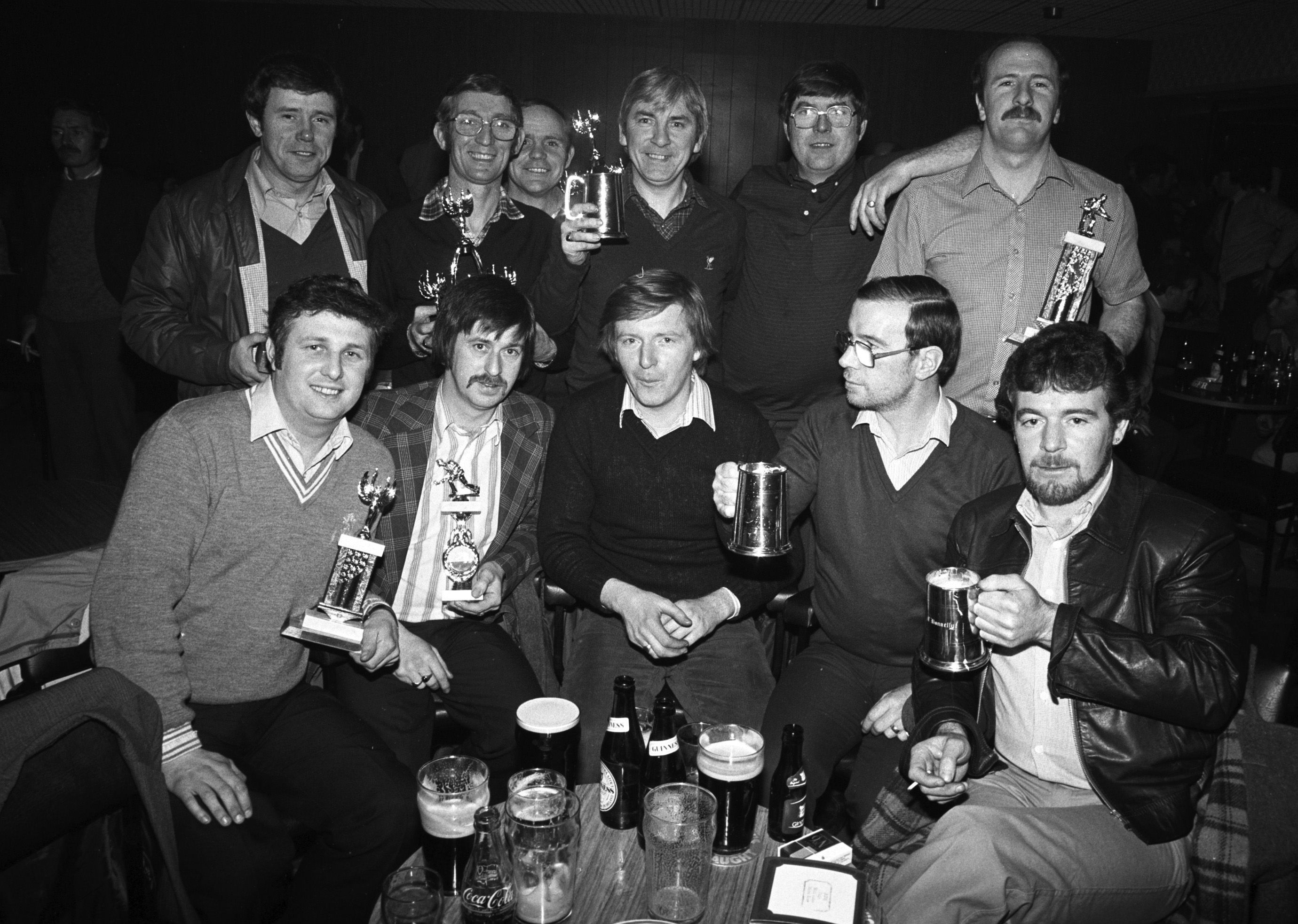WE look back at the stories that were making the headlines this week in the Andersonstown News in 1982
Team leaders and young people at St Michael's Youth Club prize-giving in February 1982
Never mind the Cold War, here's the Coal War
A LOCAL coal merchant has alleged that he is being bullied out of business by other coalmen who are using their membership of a trade union as a lever against him.
Local coal merchant Ciaran Devine has claimed that rival coalmen are successfully pressurising coal suppliers with the threat of industrial action, to refuse to deal with him. On Friday 19th February two coal importers refused to supply Devine, while another would only deal with him on condition that in future Devine obtained his fuel from their company alone.
For the past nine months Mr Devine has provided coal at below average prices. Although rival coal merchants allege he is stealing their trade, Devine claims that with new housing estates being built and many homes being refurbished there is ample room in the market for his service. At present Ciaran Devine is unable to obtain the coal he requires because of union pressure.
All local coalmen, with the exception of Devine, are members of the 'Bell' section of the ATGWU. This section is a 'closed shop' and only its members who hold 'bell cards' are entitled to hawk coal from door to door.
ccording to Ciaran Devine, this 'closed shop' is not protecting ordinary workers, but is designed to protect the monopoly of the coal families. The bell section is, says Devine, an employers' union to which, for several months now, he has been unable to gain admission.
Mr Sam McVeigh, Branch Secretary of the Coalmen's Union (which is made up of workers involved in all aspects of the coal trade), explains that the bell men are angry because they believe Mr Devine's cash and carry operation is "cutting their throats." Mr McVeigh states that ordinary bell men may spend years building up a trade or may buy their trade in an area for thousands of pounds.
"It is only understandable then," he went on, "that when they see Mr Devine getting their trade through, as it were ‘the back door’ that they will try to black him.”
When it was suggested to Mr McVeigh that there was now an increased demand for solid fuel in West Belfast, he replied that he would "not disagree with this."
One local coal trader admitted that if the dispute between Devine and the other coalmen escalates into a "coal war” the ordinary consumer could suffer with the coal merchants buying cheap, low quality fuels, so that they can undercut each other’s prices.
Liz Dennis and Lena Jackson (Cancer Research) receive cheque at the Charity Function in The West Club
Womens’ events
MARCH 8 has traditionally become a day of celebration for women all over the world although it began as an occasion for mourning. The date was originally chosen to make the anniversary of a tragic fire in the United States in which many women died because the doors of the factory where they worked were locked during working hours.
This year a weekend of activity to mark International Women’s Day is being organised in West Belfast beginning with an exhibition in the Felons’ Club on Saturday 6th March, 1-5pm.
The exhibition, organised by a group of local women, attempts to look at all aspects of life for women here. Topics covered include:
Women and work.
The women in Armagh Gaol.
The work women have done in areas around flood relief, childcare facilities and civil liberties.
The women who have lost their lives in Belfast in the past number of years.
The part women have played in the national struggle.
Some of the women whose work and experiences are covered in the exhibition will be in the Felons’ Club on Saturday afternoon to talk to anyone interested in having more detailed information.
On Saturday night there will be a social in the Crescent Community Centre in St James’ at which a play about the women in Armagh Gaol will be presented.
On Sunday 7th, The National H-Block/Armagh Committee is holding a rally and picket outside Armagh Gaol which they hope everyone will support.
Buses for the picket leave Dunville Park at 12.30pm and the are is £2.
About 100 women are expected to come from England for the weekend and anyone who could provide billets for these people should connect J Austin.
Eileen Duffy, Noel Doran, Nicola O'Halloran with Pat and Pauline Johnston and Geraldine Johnston and Bell Campbell at a Charity Function in The West Club
Editorial: EU court moves against corporal punishment
THE decision by the European Court to outlaw corporal punishment in schools has met with a mixed reception here.
Although the majority of teachers would appear to be in favour of retaining the strap as last resort in maintaining discipline in the classroom they have the unenviable task of defending what in actual fact is the inflicting of physical pain as a means of keeping order in school.
Some people say that to resort to physical violence, even on such a minor scale, is an admission of failure by the teachers and a rejection of persuasion and reason as a means of maintaining discipline and can never be justified.
We would question these latter assertions and maintain that the decision of the European Court owes more to an inflated sense of 20th century liberalism than to the actual welfare of schoolchildren. As often happens in cases of all-embracing legalisation such as this, the cure could quite well be worse than the disease.
That discipline has to be maintained is not disputed by the court, yet with one sweeping judgement they have removed from the teacher an excellent means of redressing the minor infringements of discipline in schools. The strap, or in most cases, the threat of the strap, was sufficient to deal with these without any fuss or bother, or any serious threat to teacher/pupil relationships.
The court’s decision means that teachers have now got to find other means of combating minor discipline problems which may not only distort the seriousness of the problem, but may quite well lead to a lasting effect on relationships.
In the long run, who is to say that detentions, isolation, extra homework, or expulsion, are any less destructive than a quick sharp clout of a strap on the palm of the hand.
Let’s not forget that the more serious discipline problems in schools were never dealt with by corporal punishment, but rather by the type of punishment we have just mentioned. This decision by the European Court may make adults more civilised but whether it leads to a more civilised school life remains to be seen.
The Young Lions at Crumlin Star Social Club awards night







